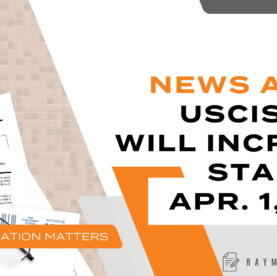Amidst Ongoing Labor Shortage, USCIS Processing Delays Prevent Noncitizens from Work
While a labor shortage continues to affect critical industries in the United States, over one million noncitizens eagerly await the U.S. government to issue their work permits. Despite many already losing their jobs, U.S. immigration officials continue to struggle to address the significant backlog of immigration cases.
The Labor Shortage
In the past two years, the COVID-19 pandemic has disrupted nearly everything in our lives. Among those disruptions was a significant change to the labor market in which available positions exceeded the number of available workers, causing a labor shortage. Experts attribute the labor shortage to a number of potential causes, but some suggest a lack of immigrant labor is at least partially to blame.
A recent article by Bloomberg analyzed the status of immigrant labor in the United States, suggesting the cumulative effect of years of dysfunction in the American immigration system is contributing to a growing backlog of cases, effectively slowing the immigration system to a halt. As millions of jobs remain unfilled, millions of qualified noncitizens continue to await their work permits. Still, increasingly lengthy processing times prevent many noncitizens from being able to work.
Over One Million Work Permits Remain Pending
The numbers clearly reflect the problem. According to USCIS data, the estimated waiting period for employment authorization (a work permit) has ballooned to as long as 12 months, up 3 months from 2020. Under federal law, agencies should take no longer than 180 days to process these applications, although that is not a legal requirement. Due to increased wait times, the number of pending applications continues to grow.
As of Sept. 30, 2021, there were nearly 1.5 million pending applications for employment authorization, compared to approximately 649,000 at the end of the previous fiscal year. Viewed in the context of the labor shortage, the pending applications could fill over 10 percent of the 10.9 million available jobs in the United States.
Economic and Emotional Toll of USCIS Delays
The USCIS delays impose a frustrating economic and emotional toll on the noncitizens forced to put their lives on hold while awaiting a decision. Indeed, they are often “forced to dip into savings to cover immigration costs and life expenses.” While the backlog of immigration cases continues to grow, lack of transparency continues to surround USCIS processing times. For many noncitizens, the only recourse is filing a federal lawsuit – a costly and time-consuming endeavor.
USCIS Director Ur Jaddou has acknowledged the current processing times are unreasonably long, stating that “USCIS has implemented new policy and operational improvements to reduce both the number of pending cases and overall processing times.” But these efforts, including the lengthening of visa validity times and offering automatic extensions for certain visas, have not addressed the broader issue.
While many vulnerable individuals wait as many as 12 months to have their applications reviewed, one stark reality underscores the problem: U.S. immigration officials take just 12 minutes to review a work permit application.
To learn more about this blog post, or if you have any other immigration concerns, please feel free to contact me at rglahoud@norris-law.com or (484) 544-0022.



